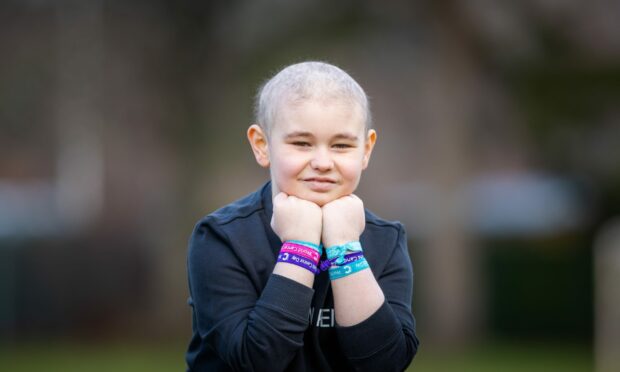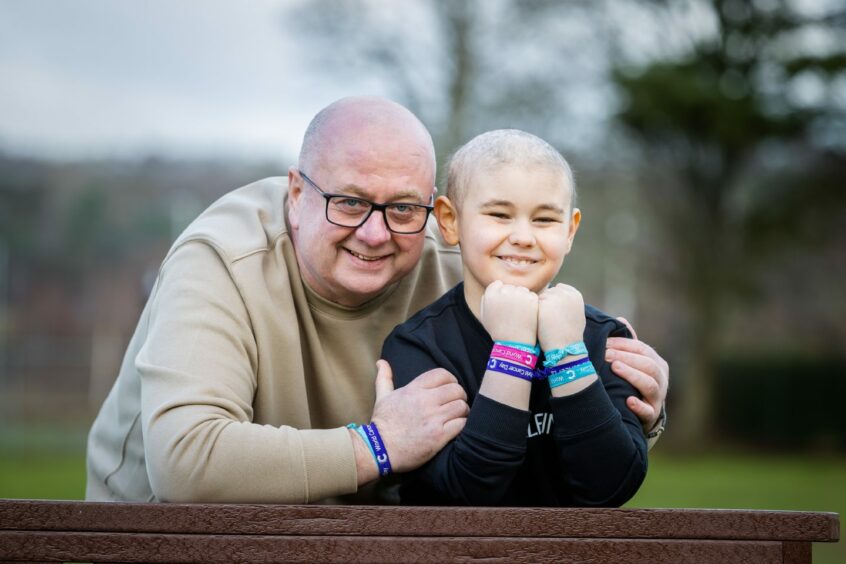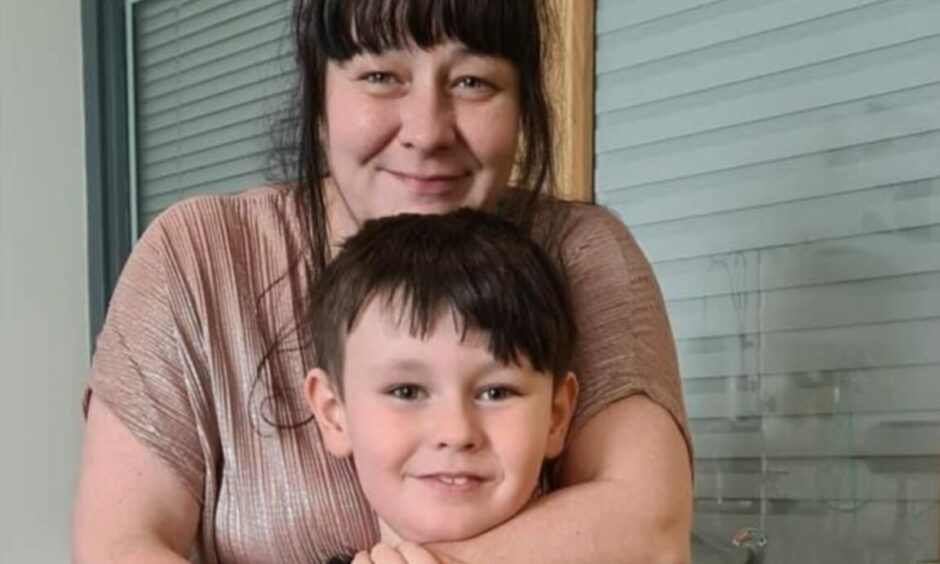A young boy from the Highlands who has faced not one, but two cancer battles in his seven-year life, has been saved thanks to stem cells from a baby’s umbilical cord.
Seven-year-old Riley Maclennan, from Ness Castle in Inverness, is now heading up a fundraising campaign for World Cancer Day in Scotland following the happy news.
Little Riley wants people to support Cancer Research UK by buying a brightly coloured unity band for £2.
Riley is in remission from his second cancer thanks to stem cells taken from a new baby, which he received on September 23 last year.
He endured chemotherapy and weeks in isolation hundreds of miles away from home at hospital in Glasgow.
Mum Moira, 45, and dad Kevin, 55, have been with Riley in Glasgow since February, but got home to Inverness shortly before Christmas.
The family are urging people to raise money for life-saving research by making a donation and wearing a Cancer Research UK unity band on Friday February 4 – which as well as World Cancer Day also marks the charity’s 20th anniversary.
Mr Maclennan told The Press and Journal that the family never had a choice but to be brave.
He said: “People often say ‘I don’t know how you are coping with it all, you are so brave’. But the truth is, there is no option.
“When your child has cancer you will do everything you can to fight for them.”
The family thought the cancer was over after a four-year battle… but it returned
Riley first contracted cancer on December 1 2016, at the age of two. He was diagnosed with Acute Lymphoblastic Leukaemia, a cancer of the white blood cells.
After a four-year cancer battle he “rung the bell” of the cancer clinic to mark the end of his journey.
“We then had a year before a blood result at Raigmore hospital showed his platelet count was 2,000, when it should have been somewhere between 150 and 200,” his dad said.
It wasn’t until May 15 that Riley was diagnosed with myelodysplastic syndrome, a type of blood cancer that is very rare in children. In fact no one else in the world has the same condition as Riley.
Doctors explained that some people with myelodysplastic syndrome go on to develop acute myeloid leukaemia and that in Riley’s case the risk of this was very high unless they moved quickly with treatment.
The family were advised that Riley’s best chance of recovery was a stem cell transplant, using stem cells from umbilical cord blood.
Riley then had intense chemotherapy in an isolation room over 14 days before he was ready for the transplant at the Queen Elizabeth University Hospital in Glasgow. It was administered in to Riley’s bloodstream through a syringe.
Mr Maclennan said: “We’ve been given the greatest gift of all from a stranger. The stem cells from the umbilical cord looked just like a small bag of blood but they had amazing power. Riley’s blood counts are great now and there are no signs of leukaemia cells. That means the world to us.”
Transplant was chance of a ‘new start’
Mr Maclennan said: “There were so many hard parts of Riley’s treatment but the transplant in September was the chance of a new start.
“It was a gradual recovery in hospital but by November we received the best results possible when tests showed that Riley’s blood was 100 per cent donor so the transplant had worked.
“We owe all the staff at the Royal Hospital for Children in Glasgow a massive thank you.
“We’ve been through a lot as a family but now if we can help others we will.
“That’s why we want everyone across Scotland to get one of Cancer Research UK’s Unity Bands. Wearing one is such a simple way to show solidarity with people affected by cancer, while also raising vital funds.”
What is World Cancer Day?
Marked on February 4, World Cancer Day is an international initiative, uniting people across the globe to take action against the disease.
For Cancer Research UK the awareness day takes on extra significance this year, as it celebrates its 20th birthday.
While the charity was formed in 2002, its history dates back to the founding of the Imperial Cancer Research Fund in 1902.
Its work has been at the heart of some of the biggest developments in cancer, from radiotherapy to some of the most used cancer drugs around the world today.
Cancer Research UK spent nearly £30 million last year in Scotland on some of the UK’s leading scientific and clinical research.
The band is available online and in Cancer Research UK shops in three different colours – pink, navy and blue. It can be worn in memory of a loved one, to celebrate people who’ve overcome cancer or in support of those going through treatment.
Unity Bands are available in Cancer Research UK shops and online at cruk.org/worldcancerday for a suggested donation of £2.


